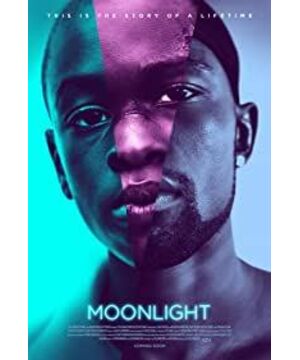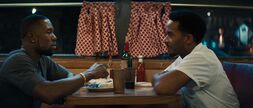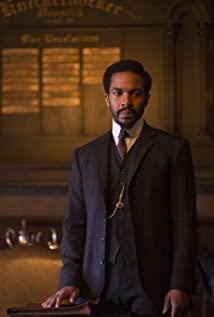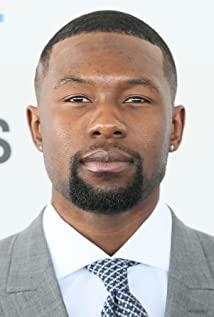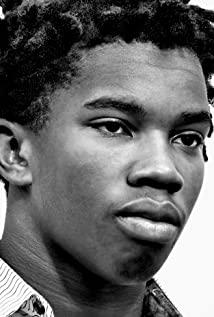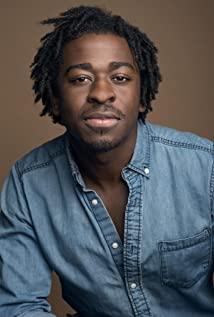The film begins with an unambiguous fixed shot. A brightly painted light blue car slowly drove in and parked on the side of the road obliquely. A sturdy middle-aged black man, Juan, got out of the car. The camera revolves around and outlines the typical appearance of black colonies: young people with exaggerated hairstyles, surly temperaments, and rough talk are fighting with each other, and Juan, who is unsmiling on the side, is the leader of the gang. The camera shows Chiron, a fast-running boy, who was nicknamed Little by his classmates because of his short stature. The hand-held camera lens shook violently, and the atmosphere of tension and panic was evident. In a hurry, Chiron hid in an empty house and happened to meet Juan. Chiron's mother is an idiocy addict. New sexual partners come to the house from time to time, and she screams intimidation to her own son except for indifference. On the contrary, Juan and his girlfriend Teresa take care of Chiron in every possible way like surrogate parents. They have material help, such as a clean and spacious bed, hot delicious food, and no lack of spiritual comfort. The scene of Juan driving Chiron to the beach to play especially makes People are deeply impressed, and the pulsating seawater is exactly the ripples in the hearts of the audience. However, things that are too beautiful always have the potential to take a turn for the worse.
The dinner table.
Chiron: My mother takes drugs?
Juan: Yes.
Chiron: Do you sell drugs?
Juan: Hmm... The
young Chiron was caught off guard to see the evil behind the kindness. At an age when he should be ignorant of world affairs, he saw the contradictions and insidiousness in the depths of human nature.
Time flies, and Chiron grows into a young boy. He is still bullied repeatedly in school, and home has never been a warm haven. Mother's rebuke is often accompanied by the madness of drug addiction. Teresa's house is his only refuge, but this peace is often taken away by his mother. If the secluded beach after nightfall is Chiron's only home, the boy in the same class, Kevin, is the golden wave on the sea. Shy first kiss, intense sexual experience, moonlight scattered everywhere, a white and delicate landscape painting. However, the nightmare came again, and a group of homophobic punks forced Kevin to fight Chiron. Afterwards, the angry Chiron chose extreme revenge. A silent sigh ended the second chapter. Chiron in the police car stared at the fearful Kevin in the corridor, with mixed feelings.
As a teenager, Chiron had a taste of love for the first time, but he was stabbed all over. Involuntary is an excuse to be abused. It is a bayonet that sees blood every minute, but it also makes the person stronger after the wound has healed.
Chiron in adulthood has a visible strong body and an invisible heart of determination. Leaving Miami, he longed to forget the past and start a new life in Georgia, but even though his memories were full of scars, he was still disconnected from him, and even if he didn't want to, he still affected his life. The mother above the white hair came by by appointment. Faced with aging, the old bohemian can only surrender, the pale force of maternal love, or the helpless despair in the quagmire of fate. Kevin, who had a brief relationship, called, followed by a highway movie-like speeding shot. What awaited Chiron was an ordinary dining car hotel and a special dinner made by the chef with a deep friendship. A series of pros and cons, the dull dialogue has a long aftertaste.
A black boy in the moonlight is blue. That thoughtful look back is a piece of sweet candy in the growth story, a scar that cannot bear to be exposed in the social documentary. In a series of shots focused on the heartbeat, in this unreasonable reality, Chiron is a worm crawling slowly and struggling silently.
The film's portrayal of the black community evokes not only sympathy, but also thinking. What runs through childhood and adolescence is the chaotic family environment, indifferent interpersonal relationships, and violent ways of survival that have appeared and intertwined one after another. He has a persevering, reticent personality, a silkworm that keeps cocooning, trying to build a strong shell, even if it is actually vulnerable.
The most touching thing is the truth that cannot be summed up in words. A few words are enough to explain the clear plot, which is infinitely extended in the beautiful and heartbreaking picture. This sad story with bright colors will never be finished, but it does not hinder his growth. If your birth was a mistake, and if life deceived you from the beginning, how should you face the new beam of sunlight that shines through the window every morning?
There is no choice, you have to face it. The social picture through the lens of African American independent film director Barry Jenkins is not about blood splattering cruelty, but about the desperation that is close at hand but relatively speechless, and the courage to regroup after turning and leaving.
View more about Moonlight reviews


